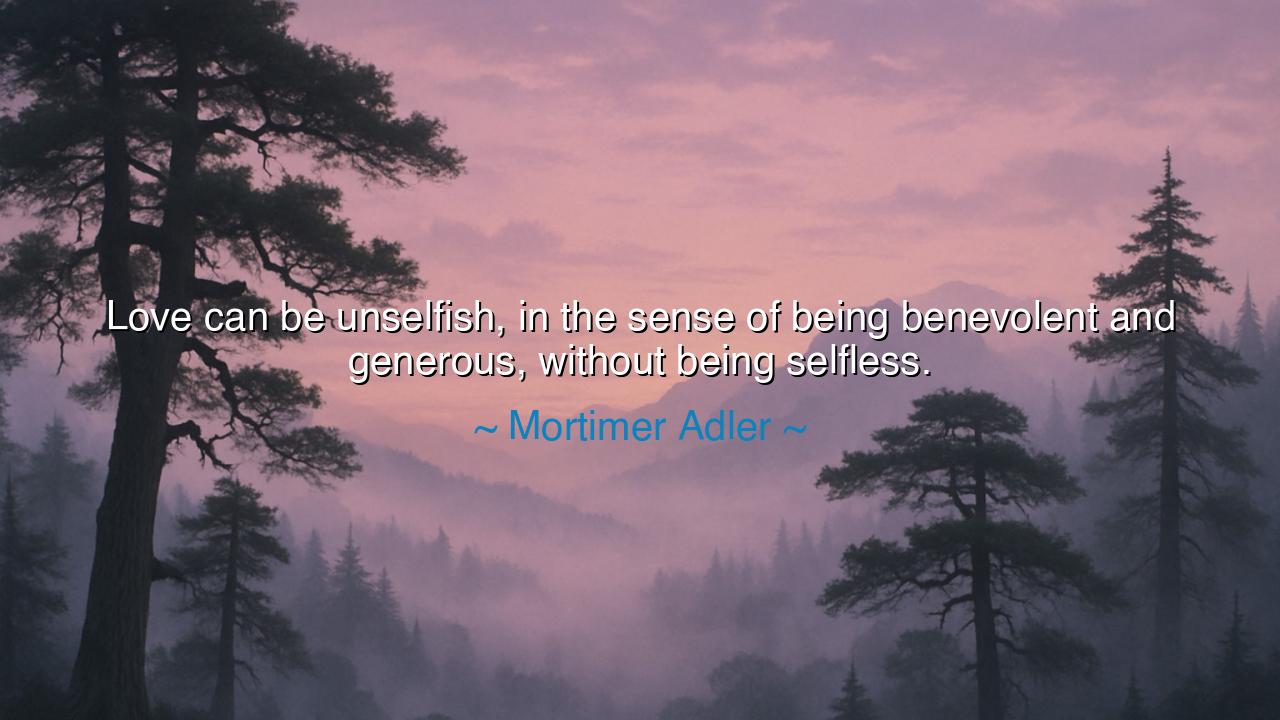
Love can be unselfish, in the sense of being benevolent and
Love can be unselfish, in the sense of being benevolent and generous, without being selfless.






"Love can be unselfish, in the sense of being benevolent and generous, without being selfless." – Mortimer Adler
In these subtle yet profound words, Mortimer Adler, the philosopher of reason and ethics, uncovers a truth that lies hidden beneath the surface of human affection. He teaches us that love, though radiant and giving, is not a thing that demands the extinction of the self. Rather, it flourishes through balance — a harmony between benevolence and being, between giving to another and remaining true to oneself. To love well, Adler tells us, one must be unselfish, but not selfless — for the one who erases themselves in love destroys the very vessel through which love flows.
The origin of this insight springs from Adler’s lifelong study of virtue and the moral life. He understood love as an art of both reason and soul — a noble act of will directed toward the good of another, yet grounded in the recognition of one’s own worth. Unselfish love, in his view, is benevolent — it seeks the happiness of the beloved. It is generous, for it gives freely without demanding return. But selfless love, when misunderstood, can become destructive — it asks the lover to vanish, to deny their needs, their dignity, their humanity. And where the self is annihilated, true love cannot live.
The ancients, too, spoke of this sacred balance. They taught that love is a reciprocity of souls, not a sacrifice of one upon the altar of another. In the philosophy of Aristotle, love — or philia — was a mutual pursuit of the good. Each person, by loving rightly, helps the other to grow into virtue and joy. This harmony of care and self-respect is what Adler restores to modern ears: that love, to be pure, must also be wise. The hand that gives must also remain whole, lest both the giver and the receiver fall into sorrow.
Consider the story of Florence Nightingale, the “Lady with the Lamp.” Her love for humanity was vast and tireless. She labored through the nights of war, healing the wounded and comforting the dying. Yet she did not dissolve herself entirely; she guarded her strength, her mind, her purpose. Her unselfish love was benevolent and generous, but not blind to her own boundaries. It was because she preserved her inner fire that she could bring light to thousands. Had she emptied herself beyond recovery, her flame would have been extinguished — and with it, her gift to the world.
In contrast, history also shows us the peril of misunderstanding love as selflessness. There are those who, in the name of devotion, have surrendered all identity — becoming shadows of another’s will. Such love may appear noble, but it is born of fear, not freedom. To lose oneself entirely is not to love, but to vanish. The true lover does not disappear into the beloved; rather, they stand beside them, radiant and whole, so that both may shine together.
Unselfish love, then, is a love of balance — a flame that warms without consuming, a river that flows without flooding its banks. It asks not for martyrdom, but for maturity. It allows us to serve, to care, to forgive, yet also to honor our own needs and truths. This kind of love uplifts both giver and receiver; it transforms service into joy, and generosity into strength. For the one who loves wisely nourishes not only the beloved’s soul, but also their own.
So, my children of wisdom and heart, remember this: to love another, you must also love yourself. Do not confuse goodness with surrender, nor compassion with self-erasure. Give freely, but give from fullness, not from emptiness. Be benevolent — let your love flow outward to bless the world — but remain anchored in your own spirit, your own purpose. For love that forgets the self cannot sustain another; but love that honors both self and other becomes a fountain that never runs dry.
In the end, Mortimer Adler’s teaching stands as a torch for all who walk the path of love: “Love can be unselfish, in the sense of being benevolent and generous, without being selfless.” Let your love be noble, but not naïve; giving, but not consuming. Be whole in your loving, and your love will become eternal — a union not of sacrifice, but of shared strength, where two hearts give and grow together beneath the eternal light of understanding.






AAdministratorAdministrator
Welcome, honored guests. Please leave a comment, we will respond soon